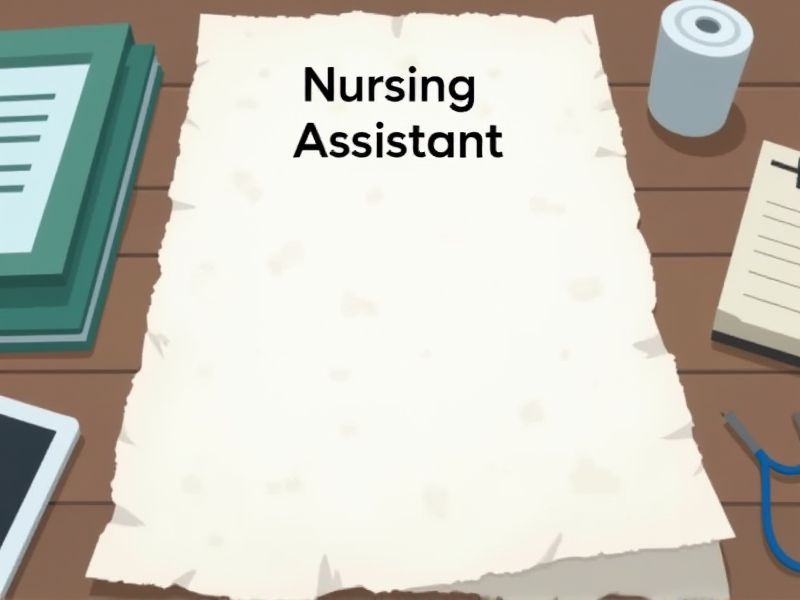
Nursing assistants play a crucial role in patient care, requiring a range of competencies to effectively support healthcare teams. Specific certifications ensure that nursing assistants possess necessary skills and knowledge to deliver safe and efficient care. These credentials verify a baseline level of competency and promote professional growth within a regulated framework. Here are some important certifications nursing assistants may need.
Certified Nursing Assistant (CNA) Certification
Achieving CNA certification equips nursing assistants with essential skills and knowledge, ensuring they provide quality care. The certification validates a nursing assistant's competence and can increase employability in healthcare settings. Regulatory bodies and employers often mandate CNA certification, ensuring standardized care across facilities. Certified nursing assistants typically gain access to better job opportunities and higher potential salaries in the industry.
Basic Life Support (BLS) Certification
Basic Life Support (BLS) Certification equips nursing assistants with essential skills for effective emergency response, which can increase patient survival rates during critical situations. Healthcare environments often face unexpected emergencies, and certified personnel can act swiftly and confidently. Certification ensures nursing assistants are updated on the latest cardiopulmonary resuscitation (CPR) techniques and automated external defibrillator (AED) usage protocols, aligning with current healthcare standards. Many healthcare facilities require BLS certification as a prerequisite, enhancing employability and professional competence for nursing assistants.
CPR and First Aid Certification
Nursing assistants are often the first responders in medical emergencies, requiring CPR and First Aid certification to effectively handle critical situations. The training equips them with the necessary skills to maintain patient stability until more advanced medical help arrives. Institutions mandate this certification to ensure standardized care and safety protocols are consistently upheld. CPR and First Aid knowledge reduces the risk of errors during emergency interventions, directly impacting patient survival rates.
Infection Control Certification
Infection Control Certification for Nursing Assistants reduces the risk of healthcare-associated infections by promoting best practices in hygiene and patient care. Certified nursing assistants demonstrate a commitment to patient safety, which can lead to better patient outcomes and trust in their care capabilities. Understanding and implementing infection control protocols can decrease the spread of diseases in healthcare settings. Certification enhances career opportunities, equipping nursing assistants with specialized skills that may be preferred by employers in various healthcare environments.
Patient Safety Certification
Patient Safety Certification enhances a nursing assistant's knowledge and skills in identifying and mitigating risks, leading to reduced errors and improved patient outcomes. This certification ensures adherence to standardized safety protocols, fostering consistent care across diverse healthcare settings. In achieving this certification, nursing assistants demonstrate a commitment to maintaining a culture of safety, subsequently increasing trust and accountability within healthcare teams. As healthcare systems prioritize patient-centered care, certified nursing assistants contribute significantly to achieving organizational safety goals.
HIPAA Compliance Certification
HIPAA Compliance Certification ensures that nursing assistants understand how to protect patient health information, which is critical in maintaining patient trust. Without this certification, there's a higher risk of accidental data breaches or unauthorized sharing of sensitive health information. The certification also equips nursing assistants with knowledge on legal responsibilities, reducing liability for healthcare facilities. Employers often prefer certified individuals, aligning with regulatory standards to avoid penalties and ensure quality care.
Dementia Care Certification
Dementia Care Certification equips nursing assistants with specialized skills to address the unique challenges faced by individuals with dementia. This certification enhances the quality of care, improving patient outcomes and satisfaction. Given the projected increase in dementia cases, certified nursing assistants become more vital in addressing these growing needs. Empirical data suggests that facilities employing certified personnel often experience fewer instances of patient agitation and related behavioral incidents.
Fall Prevention Certification
Increased fall prevention knowledge enables nursing assistants to effectively reduce patient falls, maintaining patient safety. Certification ensures nursing assistants are proficient in identifying fall risks and implementing preventative measures. Better training in fall prevention can lead to a decrease in hospital readmission rates, which can improve healthcare facility metrics. A certified nursing assistant in fall prevention contributes to a safer environment, enhancing the overall quality of care.
Communication Skills Certification
Effective communication skills certification for nursing assistants leads to improved patient interaction, ensuring clear and empathetic exchanges. Enhanced communication reduces the risk of misunderstandings, directly impacting patient safety and care quality. Certified skills boost the confidence of nursing assistants, fostering better teamwork with other healthcare professionals. These certifications align with healthcare providers' goals to maintain high standards in patient relations and care delivery.
Medical Terminology Certification
Having a Medical Terminology Certification enables a nursing assistant to precisely understand and communicate complex medical terms, which reduces the risk of errors in patient care. This certification often results in improved collaboration with healthcare teams, as it ensures clear communication among professionals. Recognizing medical terms enhances the ability to follow doctors' orders and quickly document patient conditions. Certification frequently leads to better job opportunities, as employers value staff who demonstrate specialized knowledge and skills.
Summary
When you obtain certifications as a Nursing Assistant, you can expect improved job prospects. Employers often prioritize candidates with recognized credentials, which can lead to higher income potential. Enhanced skills and specialized knowledge from certifications can increase your competence in patient care. As a result, you may experience greater job satisfaction and opportunities for career advancement.
